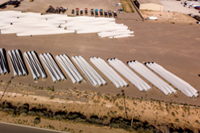Dielectric properties measurement drives this NDT system to composites market
Material-Wave Interactions Laboratories (MWI Lab, Tempe, AZ, US), a 2010 spin-off of nondestructive material inspection technology developed at Arizona State University (Tempe), is coming off a period of substantial R&D and is preparing to put its product into the composites fabrication and maintenance and repair market.
Material-Wave Interactions Laboratories (MWI Lab, Tempe, AZ, US), a 2010 spin-off of nondestructive material inspection technology developed at Arizona State University (Tempe), is coming off a period of substantial R&D and is preparing to put its product into the composites fabrication and maintenance and repair market.
Using MWI Lab’s patented radio frequency (RF) and microwave (MW) antennas, MWI provides testing services or customized manufacturing solutions using Gaussian Beam technology. These antennas and systems are used to measure the anisotropic/dielectric/magnetic material properties in advanced composites, such as honeycomb, resistive films and radome materials. Reportedly, MWI Lab’s technology can detect defects, such as subsurface voids, delaminations, faulty repairs or RF and MW leakage, in composite structures.
The technology is the brainchild of Rudy Diaz, an engineering professor at ASU, and Jeff Peebles, MWI Lab president and formerly of ASU. The two hatched the plan to measure dielectric values as a means to evaluate material properties while working together for a time in the aerospace industry 20 years ago, but the computing power to drive the technology was lacking until they reconnected at ASU in the 2000s. More powerful computers then enabled the design of new-generation antennae and near-field sensors. Computing speeds today enable MWI Lab’s Gaussian Beam system’s unusually high speed of interrogation — as few as 2-3 minutes, compared to hours for comparable systems.
MWI Lab’s noncontact Gaussian Beam antennas have a planar-wave, broadband, narrow beam (without focus points) spot sizes and offer relatively large dynamic ranges when used in insertion loss, reflection loss, composite repair and RCS applications. Data collection and signal processing is provided by analyzers manufac- tured by Keysight Technologies (Santa Rosa, CA, US).
Matthew Witte, chief commercial officer at MWI Lab, says potential applications range from in-line/in-process analysis during manufacturing to prepreg manufacturing to composites repair. MWI Lab is focused on a handheld unit (due out yet this year), which can provide high-speed composites surface interrogation at a variety of depths and sensitivities, as well as rental scanners to assess a variety of parts, particularly for aerospace applications.
MWI Lab is seeking channel partners to help it move its dielectric-measuring technology into the composites marketplace. Interested parties are encouraged to email Witte.
Related Content
-
Nine factors to consider when designing composites cure tooling
Gary Bond discusses the common pitfalls and compromises when designing good cure tooling and their holistic significance for a robust composite production process.
-
3D-printed CFRP tools for serial production of composite landing flaps
GKN Aerospace Munich and CEAD develop printed tooling with short and continuous fiber that reduces cost and increases sustainability for composites production.
-
Composite prepreg tack testing
A recently standardized prepreg tack test method has been developed for use in material selection, quality control and adjusting cure process parameters for automated layup processes.















